

Pre-K Tour Materials
Next steps
Thank you for exploring Blake. We hope your visit offered new insights and heightened your interest in Blake for your child. Below are next steps in the admissions process.
n Apply to Blake
If you have not already applied for admission to Blake, we encourage you to do so. Links to our online application for the 2025–26 school year can be found on the admissions page of the Blake website (blakeschool.org/admissions). The first-round application deadline for admission next fall is January 31, 2025.
n Schedule Screening (Pre-K to grade 5) or Testing (grades 6–12) for Your Child
Once you submit an application, you can schedule screening or testing for your child. Applicants from Pre-K to grade 5 schedule an on-campus screening through Blake’s admissions portal. Applicants to grades 6 through 12 can register for the Secondary School Admissions Test at ssat.org.
n Schedule a Visit for Your Child
Once you submit an application, we will reach out to you to schedule a visit for your child. Spending a day (or part of a day for our youngest applicants) at Blake is a terrific way for students to experience classroom and social life here.
n Apply for Financial Assistance
We welcome your interest in financial assistance to afford Blake. You can find information about our needbased financial assistance program and application on the Blake website. The deadline for submitting an application for financial assistance is January 31, 2025.
Please call the Admissions Office at 952-988-3420 if you have questions.
Thank you for considering Blake. Our goal is to create a personalized, warm and enjoyable experience for every family as they discover what their child can become at Blake. We are happy to answer any questions, so feel free to contact us.
Joe Silvestri
Director of Admissions and Financial Assistance School: (952) 988-3422
Mobile: (612) 437-5259
JSilvestri@BlakeSchool.org
Tony Andrade
Associate Director of Admissions Grades 6–12 Admissions Coordinator School: (952) 988-3424
Mobile: (612) 916-2046
TAndrade@BlakeSchool.org
Lynn Loew
Assistant Director of Financial Assistance Grades 2–5 Admissions Coordinator School: (952) 988-3423
Mobile: (612) 368-5420
LLoew@BlakeSchool.org
Laura Mark
Assistant Director of Admissions for Early Childhood Education, Grades Pre-K–Grade 1 School: (952) 988-3570
Mobile: (612) 368-5420
LMark@BlakeSchool.org
Pre-Kindergarten
Children at the center, supported by teachers, rooted in community
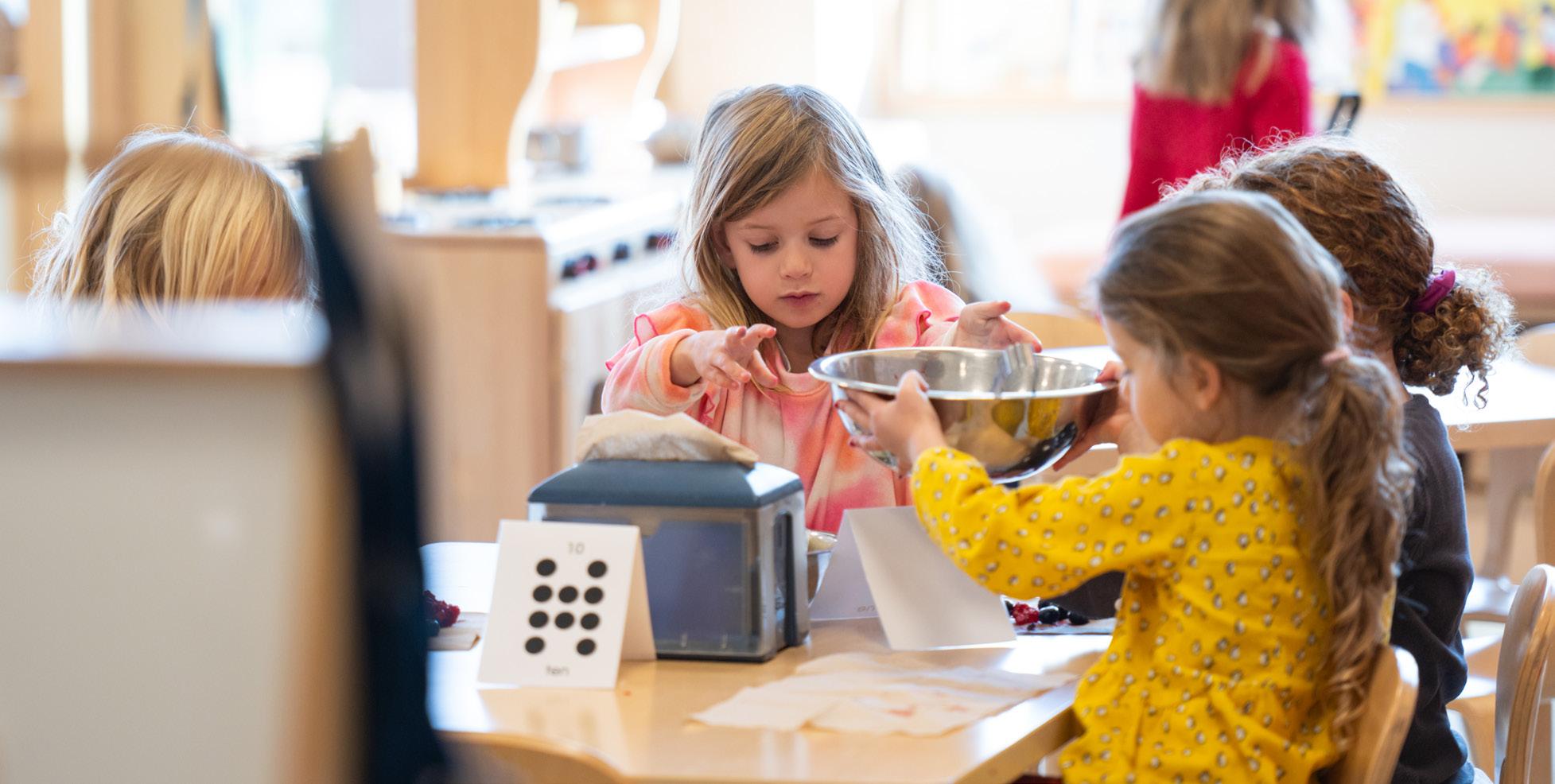
EARLY CHILDHOOD EDUCATION AT BLAKE
Children at the Center
Blake’s early childhood education is built on a foundation of Reggio Emilia-inspired pedagogy, grounded in the belief that respect for the child is the single most important tenet of meaningful education. A Reggio-inspired program actively places the children at the center of their educational experience, supported by teachers and rooted in community.
Children thrive in an environment that allows them to feel physically and emotionally safe. It is a place where their experiences, cultures, abilities, challenges, fears, questions and passions are invited and cherished by teachers, and where what each child thinks and feels matters. The teacher uses this understanding to set goals and determine the direction and pacing of learning for each child.
STUDENTS ARE VIEWED AS COMPLEX, POWERFUL MAKERS OF MEANING
Students not only formulate answers to questions posed by adults, but most importantly, they construct their own questions and objectives throughout their educational journey. Blake teachers guide and challenge students as they develop increasingly sophisticated hypotheses and understandings about the world. When presented with hands-on or imaginative experiences or materials for experimentation or play, young children become utterly absorbed in the task at hand. These experiences are the deepest and most powerful forms of learning for young children. When encouraged to reflect, children build upon their own prior knowledge to forge new understandings. As they pursue these ideas, they build initiative, develop autonomy and gain a sense of their own competence.
SUPPORTED BY THE TEACHERS
Blake’s emergent curriculum begins with careful observation and reflection of the children’s interests, play, needs and response to materials and curricula. In this environment, adults value the children’s initiatives and help them develop autonomy. Teachers explore and discover what children need and then prepare the environment to support, sustain and extend these emerging ideas that help children represent their experiences in multiple ways. Teachers provide the scaffolding to help students reach the next level of learning while supporting early literacy, mathematical, scientific and critical-thinking skills.
SUPPORTED BY THE SPACE
Significant learning takes place between children and their environment, as well as among children and their classmates, teachers and community members. Children are active participants in the school and the larger world, and through these interactions, students learn the skills needed to function respectfully in society: cooperation, compassion, empathy, assertiveness, responsibility and self-control.
Blake’s Pre-K Early Learning Center (ELC) classroom environments—the spaces, materials, opportunities and invitations—are considered the third teachers. Beyond the child’s family and the educators at school, a thoughtfully set-up and intentionally planned environment plays an important role in the child’s learning experience. The engaging atmosphere allows children to make decisions about where they will spend their time and what they will explore. Multiple spaces within the larger classroom offer challenges and opportunities for children to interact and try new experiences. It is a place where teachers can observationally assess their students over time as they engage in a variety of work and play activities. The generous spaces provide areas where children can experience working individually and in spontaneous pairings, both in small and large groups.
THE PRE-KINDERGARTEN DAY
Beginning in the 2025-26 school year Blake will move to full-day Pre-K for all students. Although every day can be slightly different, a sample schedule is as follows:
7:45–8:15 a.m. Optional, complimentary care (with escort to classroom)
8:15–8:25 a.m. Children and families play and greet each other
8:25–9 a.m. Circle time
9–11:30 a.m. Depending on the day, children engage in several of the following:
Gross motor activity (either indoors or outdoors);
Independent exploration;
Teacher-initiated literacy and numeracy activities; Small group work; Specialist instruction (PE, strings, music, art, library, Spanish, engineering & programming)
11:30 a.m.–noon Outdoor exploration or recess
noon–12:30 p.m. Healthy family-style lunch
12:30–1:30 p.m. Transition and quiet rest time
1:30–3:00 p.m. Depending on the day, children engage in several of the following:
Gross motor activity (either indoors or outdoors);
Independent exploration
Teacher-initiated literacy and numeracy activities; Small group work; Specialist instruction (PE, strings, music, art, library, Spanish, engineering & programming)
3:15 p.m. Dismissal to carpool, bus or Extended Day
3:15–6 p.m. Optional, fee-based Extended Day program
SPECIALIST INSTRUCTION
Throughout the course of a week, Pre-K students have the opportunity to engage in all of Blake’s Lower School specialist offerings including:
► Art
► Music
► Strings
► Spanish
► Physical education
► Engineering & programming
► Library
OUTDOOR EDUCATION
Young children benefit from play and exploration in the natural world. Blake strives to nurture children’s love of nature, their learning 0f science and development of inquiry skills by spending time outdoors on a daily basis. Blake’s generous 55-acre campus space includes areas to explore natural settings.
Goals of outdoor education at Blake:
► encourage and sustain a sense of excitement and joy about the natural world
► build awareness of surroundings and sharpen observation skills
► enhance problem-solving and thinking skills
► connect existing knowledge to new experiences
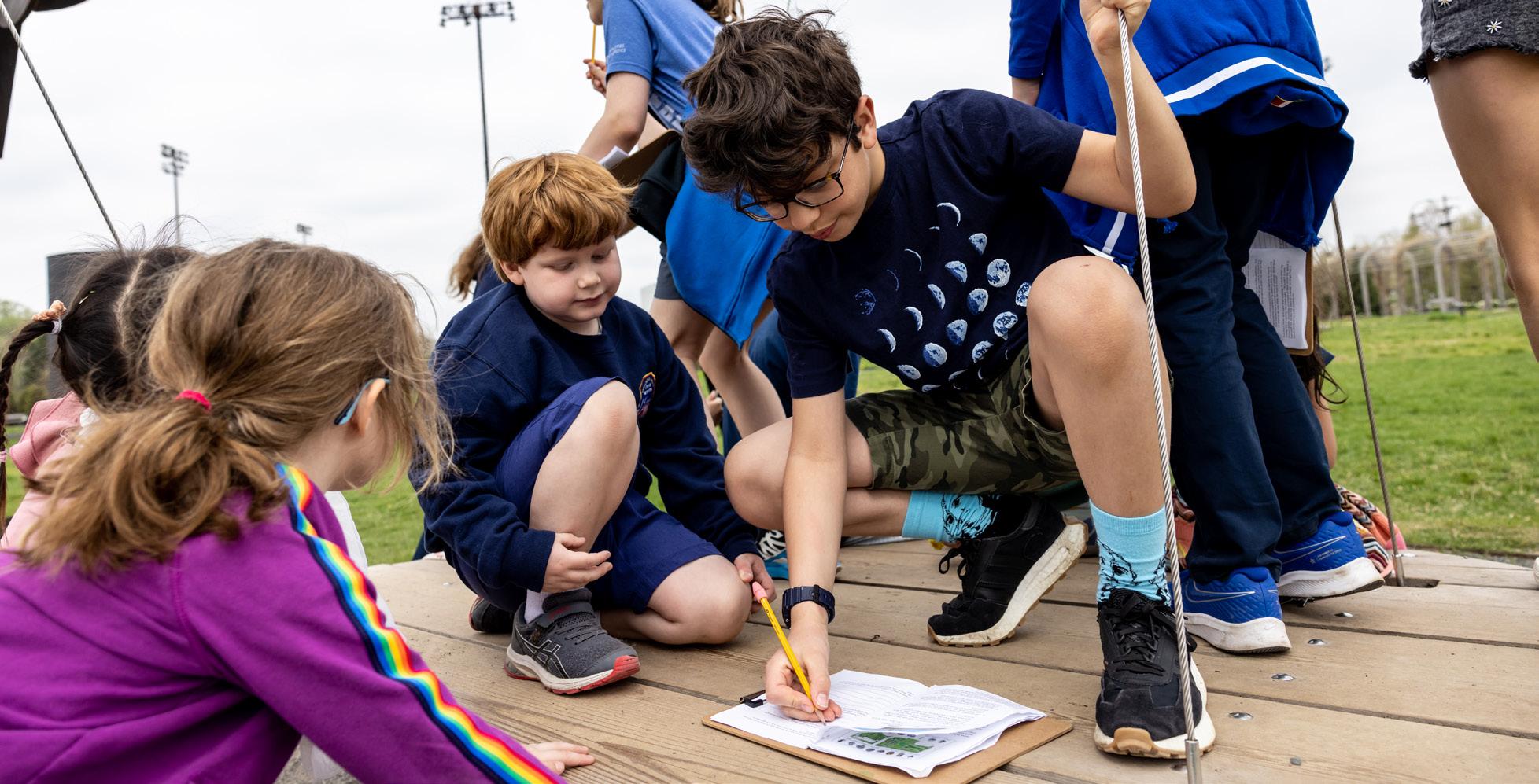
ROOTED IN COMMUNITY
Pre-K students have many opportunities to build community within their classroom and beyond.
► Once a month in the ELC, all grades gather together to share, sing, dance and learn from one another. ELC “Community Gathers” events foster relationships within the entire building.
► Every grade in the ELC has a buddy from an older grade (Pre-K has grade eight buddies, kindergarten has grade five buddies and grade one has grade four buddies) and these pairings meet monthly. Buddy time is a special moment for students to build relationships with an older student and grow that relationship for the entire year.
► Friday mornings are a designated time for community-focused activities such as field trips, celebrations, family cooking projects and a chance to explore all the Pre-K classrooms. Students get to know their grade-level peers by sharing passions, interests and traditions.
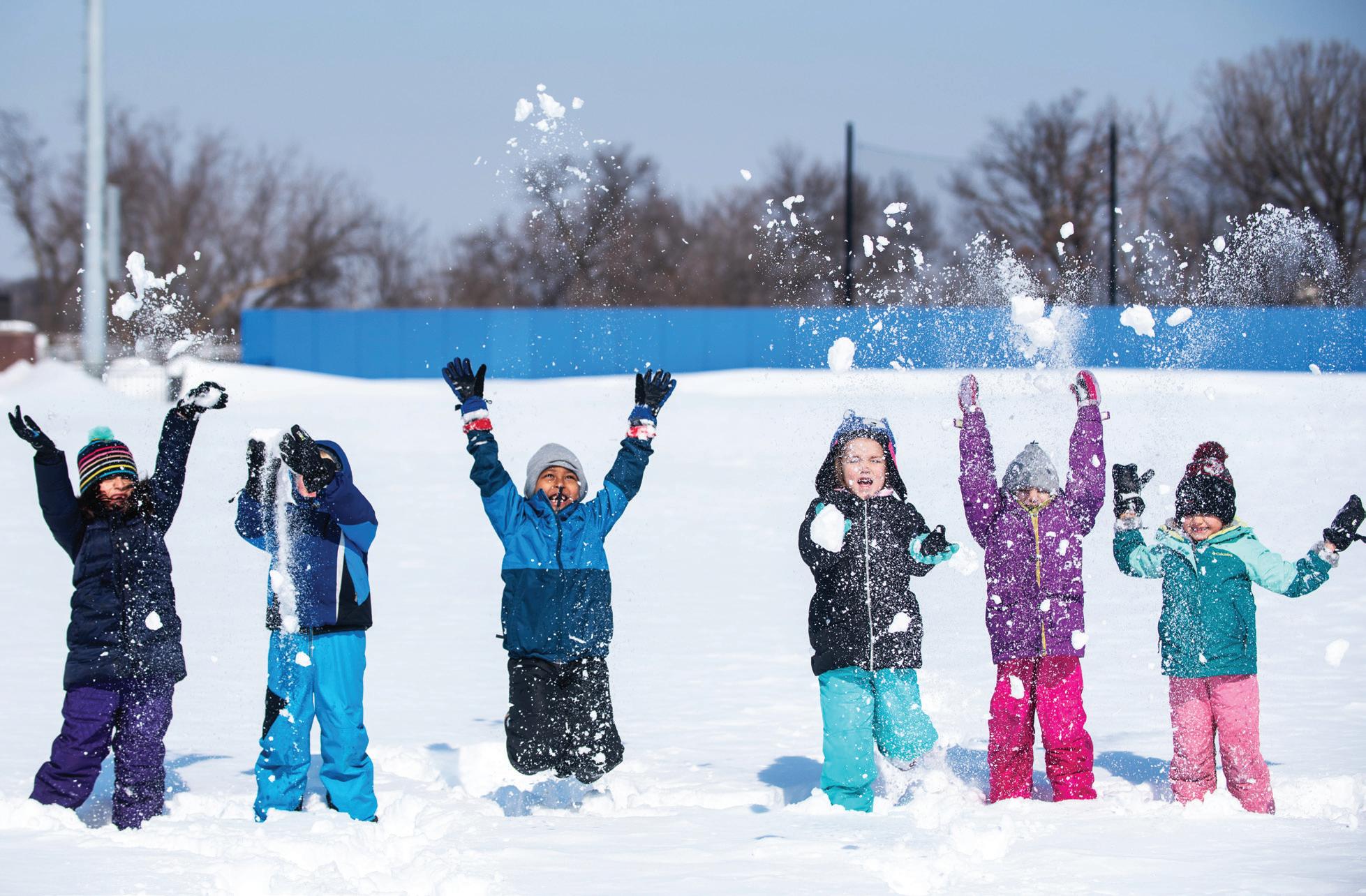
EXTENDED DAY
Complimentary morning care is available from 7:45 to 8:15 a.m. on a drop-in basis.
An afternoon Extended Day program is offered from 3:15 to 6 p.m. in a warm, secure environment where children enjoy friendships across age groups. The program includes a snack and a variety of free play and structured activities. Families may enroll students in one or more days per week.
TUITION AND FINANCIAL ASSISTANCE
Beginning in the 2025-26 school year, Blake will move to full-day Pre-K for all students. Tuition for the 2025-26 school year is expected to be $35,500. Blake will set 2025-26 tuition in January 2025. These costs include all school fees such as lunch, supplies and field trips. Afternoon Extended Day fees are between $1,193 and $5,750. Need-based financial assistance is available for all programs to families who apply and qualify.
PARENT PARTICIPATION
Lower School parents have ample and varied opportunities to participate in the life of the school and their child’s Blake experience. Leadership opportunities include serving as your child’s classroom representative or on the various Parent Association board positions. Parents are also welcome to volunteer as needed for activities, such as chaperoning field trips and organizing and staffing events.
For further questions, reach out to Assistant Director of Admissions for Early Childhood Education Laura Mark at 952-988-3570 or lmark@blakeschool.org
Early Learning Center
Building Curiosity, Connection and Community
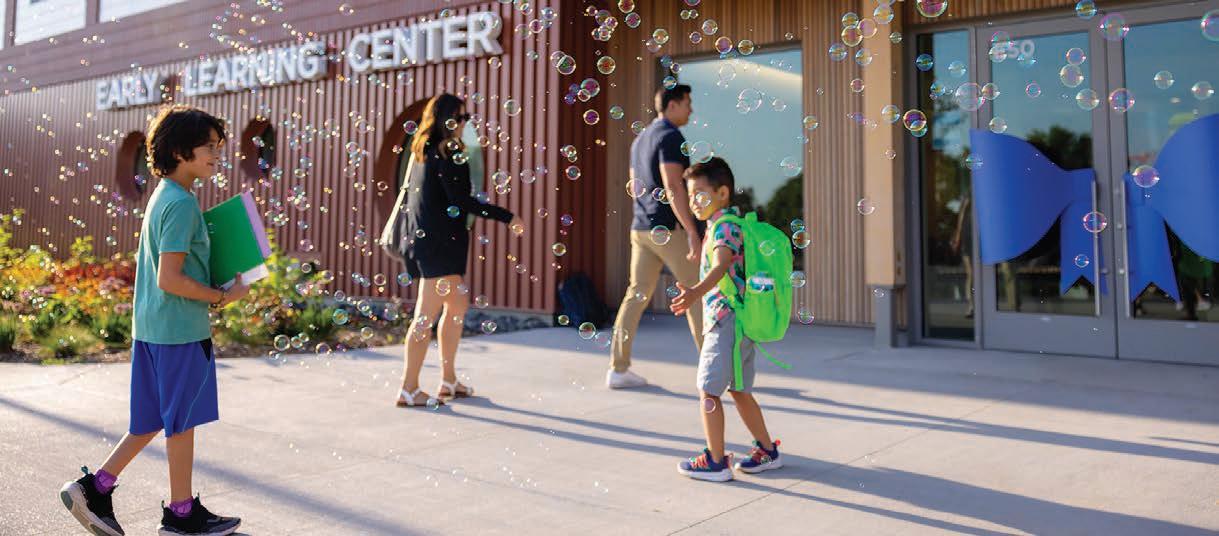
In August 2023, Blake opened an Early Learning Center (ELC) on its Hopkins campus, the first of its kind in the Twin Cities. Conceived specifically for learners in pre-kindergarten, kindergarten and first grade, the ELC offers a child-centered educational program in a green facility designed to spark curiosity, joy and growth.
THE FOUNDATION: LOVE OF LEARNING
The ELC experience lays the foundation for the remarkable journey that is a Blake education. From the starting point of their school experience, our youngest learners are in a shared educational community that teaches the habits of mind and heart embodied in Blake’s mission, core values and commitment to pluralism.
Understanding children as inquisitive, intelligent, creative and capable, Blake’s Reggio-inspired early childhood program teaches students to investigate, inquire and make connections in the world around them. Both the ELC curriculum and design teach and inspire a love of learning.
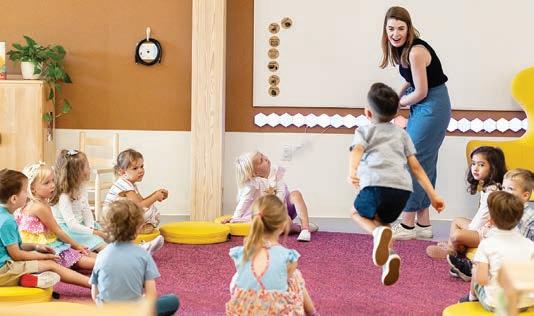
THE BUILDING: SPACIOUS & INTIMATE
Our youngest students learn best in an environment designed specifically for them. Blake partnered with HGA, an awardwinning national architectural firm, to design a facility that connects the indoors and outdoors, incorporates the wooded area of campus and uses green building strategies. The ELC is certified by the Leadership in Energy and Environmental Design rating system (LEED).
Nestled into a hillside at the top of a winding drive, the building’s three floors are elevated at half-levels: the Field Level, the Forest Level and the Treetop Level. Each grade has its own floor. Common spaces on each floor create a sense of belonging and community. From the ground up, the ELC is scaled to be both spacious and intimate with gathering places, play areas and reading nooks.
DESIGN HIGHLIGHTS
Blake’s outstanding early childhood faculty bring their deep experience, knowledge, skills and passion to ELC classrooms. The ELC offers the following features:
• Dedicated levels for PK, K and 1 to support each stage of child development
• Classrooms with easy access to the outdoors and the Blake forest
• Open and spacious common areas for gathering and dining
• Landscaping with natural play structures and adventure zones
• Learning kitchen
• Library
• Art studio
• Movement studio
• Music studio
• Strings studio
The ELC is located on Blake’s campus in Hopkins, which is home to students from pre-kindergarten to grade eight. Spreading over 55 acres of rolling hills, three distinct school settings serve students as they grow and develop from early childhood to early adolescence.
ELC students have access to the campus’s grass and turf fields, ice arena, swimming pool, and performing arts center. ELC learners have the opportunity to be mentored by older students through Blake’s fifth and eighth grade buddy programs and other inter-class activities.
SUSTAINABILITY AND CLIMATE LEADERSHIP
Blake’s outstanding early childhood faculty bring their deep The Early Learning Center is home to the state’s first fossilfuel-free non-collegiate educational building. The building runs fully on renewable energy—electricity and geothermal heating and cooling. It was constructed with local, recycled materials, and is surrounded by rain gardens and pollinatorfriendly plantings. Tapping into humans' innate affinity for nature, the ELC features large windows and skylights and easy access to the outdoors.
Blake’s early childhood educators use the building as a teaching tool to deepen students’ connection to the natural world and understand their impact on it. This focus on the environment, guided by a child-centered academic program, helps children to see themselves as capable learners, critical thinkers and problem solvers. The ELC marks a commitment to teaching about and modeling environmental responsibility for the next century of Blake students.
FOR MORE INFORMATION
Laura Mark, Assistant Director of Admissions for Early Childhood Education 952-988-3570 • lmark@blakeschool.org
2 020–2 1
Financial Assistance
What is the mission of Blake’s financial assistance program?
Blake seeks a talented, motivated and economically diverse student body and believes the cost of tuition should not be a barrier to prospective families. Our financial assistance program ensures that students from all socio-economic backgrounds can have access to a Blake education.
What does “financial assistance” mean?
This is the term used to describe funding provided to families so that they can pay tuition, afternoon programming fees and other costs associated with full participation at Blake. Financial assistance grants are based on a family’s “demonstrated need,” as determined by Clarity and the Blake Financial Assistance Committee.
What is “demonstrated need”?
This term is defined as the difference between Blake’s tuition and the amount a family can afford to pay. Demonstrated need is based on many factors (income, family size, expenses, debt, etc.) and is based solely on a family’s individual circumstances. For those who qualify, grants tend to be between 20% and 80%, although some families receive grants outside of this range.
Is financial assistance just for very low income families?
No, Blake is committed to assisting families from various income levels, as long as a family demonstrates need. Any family concerned about affording Blake’s tuition is encouraged to contact our financial assistance office at 952-988-3422.
What percent of Blake students receive financial assistance?
About 26% of all Blake students (PK–12) receive financial assistance. In total, Blake awarded $8.6 million in financial assistance grants for the current school year.
Does Blake offer merit scholarships?
No, the school only offers need-based financial assistance. Academic, athletic or artistic scholarships are not available.
If I do not qualify for need-based support for my first child at Blake, can I re-apply when a second child applies?
Yes. It is common for a family to not qualify for financial assistance when paying one tuition but then qualify for support once child #2 or #3 enrolls. Our assessment evaluates the total amount of PK-12 and college tuition a family can afford. Often a family can afford one full tuition but needs support when additional children enroll.
What does financial assistance cover?
The award is meant to make sure that all Blake students can fully participate in all aspects of the school program. The initial award reflects the cost of tuition and afternoon programming for pre-kindergarten and kindergarten. The costs of books, transportation, Extended Day instruction and other expenses may be covered as they arise.
Do I have to repay financial assistance awards?
No, repayment is not required. All Blake financial assistance awards are grants, not loans.
When will I receive a decision about financial assistance?
Families are informed of financial assistance decisions at the same time they are notified of admission decisions.
Do I have to reapply for financial assistance each year?
Yes. We want to ensure that financial assistance is only going to families who need it, so each family must complete a new application to financial assistance each year. However, if a family’s financial situation hasn’t changed, the family can expect to receive a financial assistance award similar to the previous year.
How do I apply for financial assistance?
You can find instructions at Blake’s website. The deadline to apply is January 31.
What if I am separated or divorced?
Blake requires all parents/guardians to fully complete the financial assistance process even in the case of divorce or separation. In these circumstances, divorced or separated parents file separate financial assistance forms. If a parent/guardian no longer has contact with a child, applicant families are encouraged to initiate a conversation with the Blake financial assistance office.
Is family financial information kept confidential?
Yes, all information is secured and held in the strictest confidence. Financial assistance applications are reviewed only by members of Blake’s small Financial Assistance Committee.
For additional questions or for more information, please contact Director of Admissions & Financial Assistance Joe Silvestri at 952-988-3422 or jsilvestri@blakeschool.org.
BLAKE ALUMNI AROUND THE GLOBE
► An education at Blake opens the door to an extensive Alumni network.
► Blake alumni far and near are living purposeful lives as community and global citizens.
► The five states with the most alumni include Minnesota, California, New York, Florida and Colorado.
► Blake alumni encompass all former students of Blake, Northrop, Highcroft and The Blake School, including those who left prior to graduation. Once you’ve attended Blake, we always have a place for you.
► Alumni engagement opportunities: Alumni Board
Top five alumni states in brown
Nearly 200 alumni live outside the United States. The country with the most alumni outside of the U.S is the United Kingdom, followed by Canada.
Stay up to date with Blake alumni news and events on social media www.facebook.com/blakeschoolalumni.
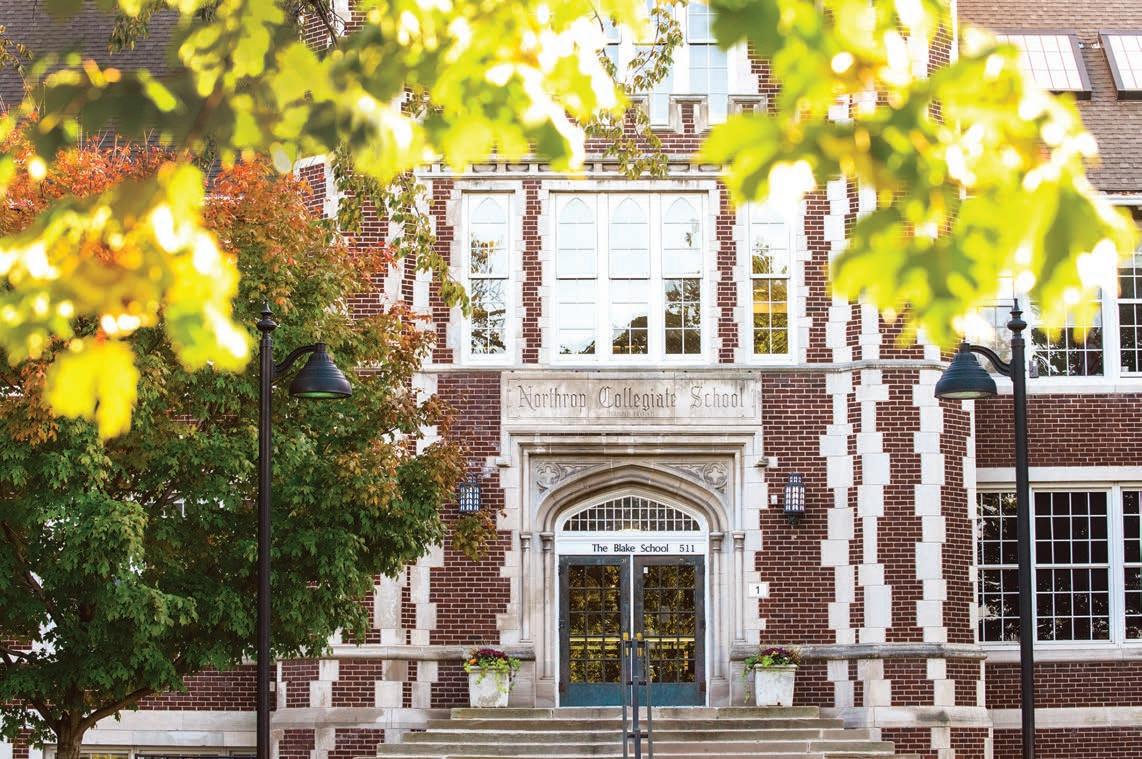
PROFILE 2023–2024
OVERVIEW
Founded in 1900, Blake is a coeducational, independent, nonsectarian day school serving 1,330 students on two campuses, Hopkins (Pre-K to 8) and Minneapolis (9 to 12). In small classes and through comprehensive curriculum, students from a variety of backgrounds and lived experiences find common ground in shared values. Blake provides ample opportunities for students to develop outside of the classroom. They not only become critical thinkers but also leaders, artists, athletes and citizens of the world.

GRADUATION REQUIREMENTS
22 credits in seven disciplines:
• Computer Science
• English
• Math
• Modern & Classical Languages
• Social Studies/History
• Science
• Visual, Performing Arts & Debate
Other courses include:
• 5 AP courses in Humanities
• 16 honors and AP courses in STEM
• 4 AP courses in Modern & Classical Languages
• Independent Study, by application
• Senior Seminar: Communication & Society: Senior Capstone Course
Enrollment in and advancement in honors and AP courses in math, science and social studies requires a minimum grade or departmental approval. Students cannot enroll in AP social studies courses until junior year.
Athletics
English
POST-AP COURSES
• All senior electives offered at post-AP level
Computer Science
• Advanced Topics in Computer Science & Intermediate Programming with Python (CMU)
Math *0ffered on a rotation, year-to-year
• Advanced Topics: Conjectures, Refutations & Proofs*
• Advanced Topics: Graph Theory & Network*
• Advanced Topics: Linear Algebra with Topics in Multi-variable Calculus*
• Advanced Topics: Interest Theory & Actuarial Math*
Modern & Classical Languages
• Advanced Hispanic Culture & Literature
• Advanced Topics: Chinese Culture & Literature
• Advanced Topics: Hispanic Theater & Film
• Advanced Topics: LeMonde Francophone
• Advanced Classics: Age of Augustus and Empire
• Advanced Classics: Politics & Poetry
Social Studies
• Advanced Topics: Research
UPPER SCHOOL CO-CURRICULARS
Student Leadership
80% of Upper School students participate in at least one of 32 sports on 77 different athletic teams. (Students commute from the Upper School to Blake’s athletic facilities in Hopkins.)
Visual & Performing Arts
Includes two choral ensembles, two instrumental ensembles and three annual stage productions. Students lead an average of six curated gallery shows and attend 45 debate tournaments per year.
Student Publications
Spectrum, award-winning student newspaper; Flash, literary arts magazine; yearbook.
Forum, student government; Community Judiciary Board; Student InterAction Committee (SIAC); peer counselors; Bear-to-Bear peer tutoring; Student Diversity Leadership Council; Student Interview and Recommendation Committee.
Academic Clubs
DECA, Quiz Bowl, Science Olympiad, math team, robotics, mock trial, ModelUN, debate.
Service Learning
25% of Upper School students choose to participate in Community Service Board committees and/or Service Path Recognition where they volunteer for at least 100 hours in one year.
GLOBAL LEARNING
• Academic immersion courses are led by Blake faculty who partner with local organizations. Destinations have included China, Sierra Leone, Cuba, Vietnam, Morocco, India, U.S.-Mexico border and Rwanda.
• Through Global Online Academy (GOA), a consortium of leading independent schools, students learn about real-world topics in a global community.
• Blake partners with School Year Abroad, the High Mountain Institute, the Alzar School and other organizations for off-campus study.
Affinity Groups
Student-led spaces for identitybased affirmation and support. Specific groups focus on gender, sexuality, religion, race, ethnicity, family structure and ability.
Clubs & Organizations
Approved and sponsored by the student government. Groups focus on creative writing, history, politics, languages, chess, arts, finance, e-sports, rocket science, the environment and more.
Blake does not rank students or weight
* Includes all Blake courses taken during the academic year beginning in ninth grade through junior year.
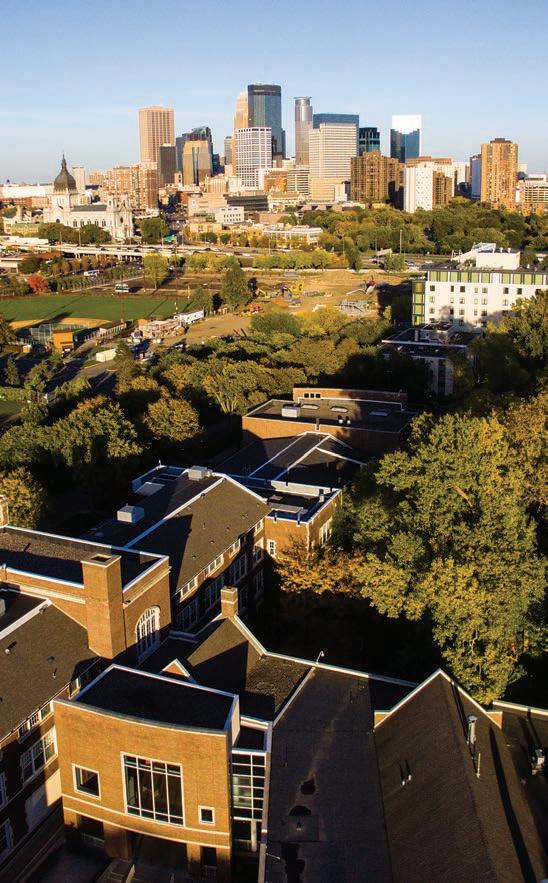
Test Takers
COVID-19: Blake shifted to remote learning for the fourth quarter of 2019–2020. Blake started 2020–2021 in a hybrid model, with half of the student body in the building each day. On Nov. 5, 2020, Blake moved to full remote learning and then resumed the hybrid model on January 19, 2021. In the 2021–22 academic year, Blake returned to full in-person teaching and learning. Students received letter grades for all courses and school years.
MISSION
Blake engages students with a dynamic, academically challenging education in a diverse and supportive community committed to pluralism and a common set of values. Students pursue an integrated program of academic, artistic and athletic activities, preparing for college, lifelong learning and purposeful lives as community and global citizens.
COMMITMENT TO PLURALISM
A vibrant learning environment springs from a diverse school community. For this reason, Blake seeks and values students, families and employees with a wide range of backgrounds, identities and life experiences. Individually and collectively, we strive for understanding across differences in an inclusive environment where everyone can belong, contribute and thrive.
CORE VALUES
Respect Love of Learning Integrity
Courage
ADMINISTRATION
Anne E. Stavney, Ph.D. Head of School
Joseph J. Ruggiero, Ph.D. Upper School Director
COLLEGE COUNSELING
Sara Kyle
Director of College Counseling skyle@blakeschool.org
Jim Mahoney
Associate Director of College Counseling jmahoney@blakeschool.org
Nora Main
Associate Director of College Counseling nmain@blakeschool.org
Wendy Johnson College Counseling Coordinator werickson@blakeschool.org
CJ Jones Eckhardt College Counseling Liaison cjeckhardt@blakeschool.org
Amanda Minoff
College Counseling Liaison aminoff@blakeschool.org
ACCREDITATION
Independent Schools Administration of the Central States (ISACS)
